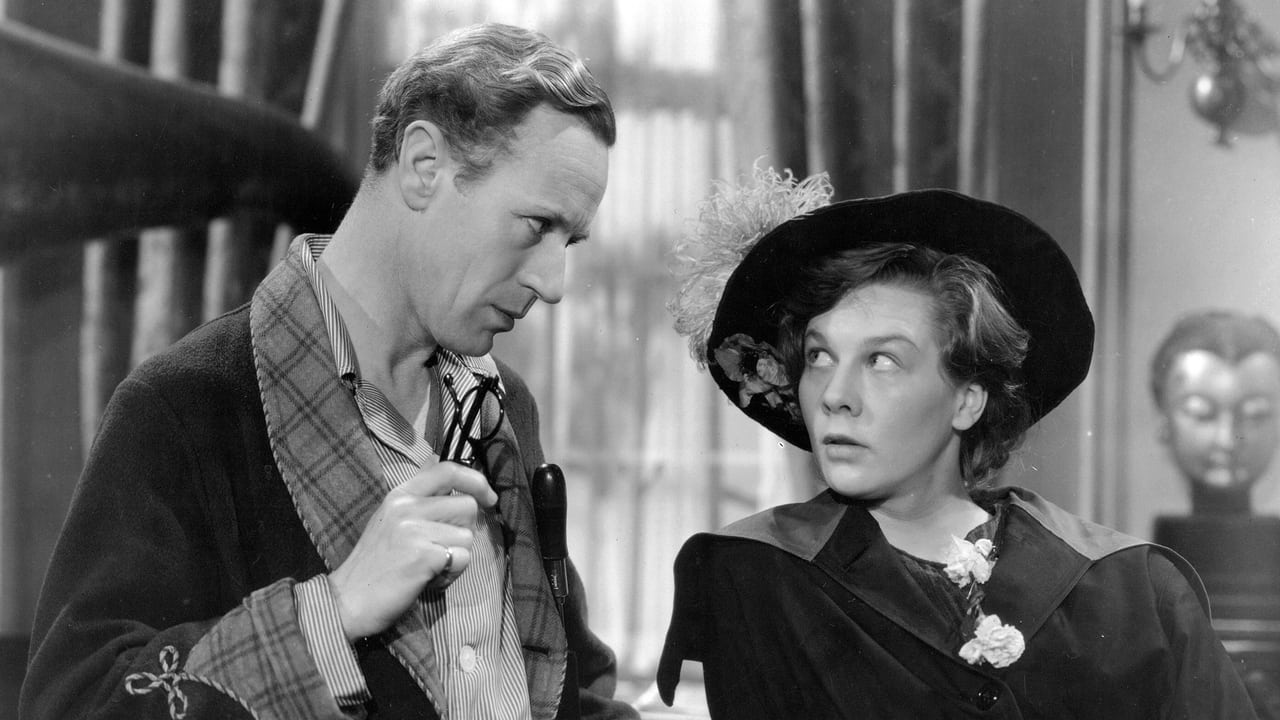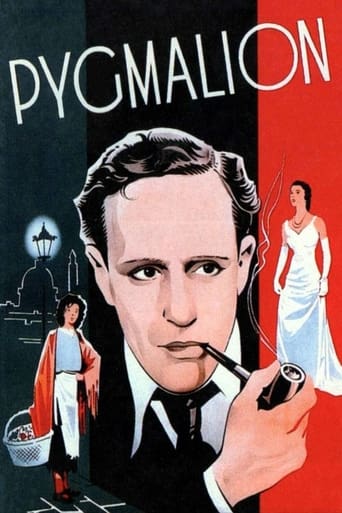

A very feeble attempt at affirmatie action
... View MoreA Brilliant Conflict
... View MoreIt's entirely possible that sending the audience out feeling lousy was intentional
... View MoreThe movie is made so realistic it has a lot of that WoW feeling at the right moments and never tooo over the top. the suspense is done so well and the emotion is felt. Very well put together with the music and all.
... View MorePygmalion is directed by Anthony Asquith and is based on the play by George Bernard Shaw. The film stars Leslie Howard, Wendy Hiller, Scott Sunderland, Jean Cadell, David Tree and Wilfrid Lawson.Snobbish and antisocial phonetics professor Henry Higgins(Leslie Howard), makes a bet that he can turn a cockney flower girl into a duchess, simply by teaching her to speak properly.The lady in question is Eliza Doolittle(Wendy Hiller).Over the course of several months Higgins drives Eliza to a near breakdown as he encourages and bullies her in equal measure to work hard and speak properly.Higgins may teach her to speak nicely but he fails to understand that a lady isn't just considered as such by how she speaks, but by how she is treated. His friend Colonel Pickering(Scott Sunderland)treats Eliza with respect and gentleness from the first moment he meets her. Higgins on the other hand treats her merely as a subject of his experiment and nothing more.When he is satisfied with her progress he takes her to a ball where she will mix with the upper classes and royalty. If the guests believe her to be one of them Higgins will have won his bet.Things are complicated when the dull but sweet Freddy Eynsford-Hill(David Tree)falls in love with Eliza. Eliza makes an interesting observation which is something worth thinking about, now Higgins has made her a lady she is not fit to sell anything accept herself. This is true, the best she can now hope for is to marry a rich man and become a beautiful ornament on his arm at social events. At least when she was poor she could find some sort of employment.Eliza dearly wants to open a flower shop but in the society that she has been elevated into such a thing would have been frowned upon.Over the years some people have longed for a romantic and happy ending between Higgins and Eliza. Shaw himself was against that and was angry when a happy ending was included in the stage play. The films ending is ambiguous because we leave the two characters not knowing what will happen to them next. It can be viewed as happy though.Personally I don't see Higgins and Eliza as a romantic couple. He comes to admire her strength, determination and he does grow fond of her. Eliza is grateful to him for bringing about a change in her life for the better but can never forget that he treated her badly at times. Their personalities are so different that I just can't see them together. I can see them as friends but lovers? No way.The cast are all superb. Leslie Howard is at his best as Higgins, he is totally swept up in his work, it is all consuming to him, he has no time for relationships or social niceties.Howard makes him slightly eccentric, with a razor sharp mind and good observational skills. The look on his face in the final scene says more than any dialogue could, it is a rare glimpse of the feeling Higgins has within but rarely shows externally. From this performance here and his role in Pimpernel Smith, I think he would have been fantastic as Sherlock Holmes, alas that was never to be, but think of how he would have been in that role.Hiller does very well as Eliza although I think she struggles somewhat with the cockney accent, she is much better in the scenes where she is learning to speak properly and in the scenes when she has made the transition from street girl to elegant lady.Wilfrid Lawson steals every scene he's in as Eliza's father and Jean Cadell is good as the tough housekeeper Mrs.Pearce. Scott Sunderland doesn't get much to do as Colonel Pickering but he is good in the scenes he's in. David Tree is good as the young rich man who falls for Eliza because she is different and exciting.
... View MoreWe've all seen the 1960s musical version of Bernard Shaw's Pygmalion - My Fair Lady. Well, the musical is great entertainment and very well done and unmissable too but this 1938 B&W film version is a revelation. It is fantastic to see different actors deliver the same lines. In my opinion the 1938 version is funnier and the characters are more fully developed so that their relationships are more interesting and engaging.I enjoyed the scene dressing and wonderful costumes in My Fair Lady but the scene dressing, props and costumes in this 1930s film are great too - woollen suits, in fact all of the clothes, made in natural fabrics like fine wool and silk, just glow in the studio lights and are stunning, and get a load of Prof Higgins' owl-spectacles (step aside Harry Potter)! I love the haircuts, the body language (even the extras walk like HM Elizabeth the Queen Mother), the make-up, the huge Bakelite telephones, the bone china tea cups - everything looks real not just a prop. The jewellery glitters, eyes glint, hair glows - everything is so well lit it really does convey candlelight or daylight. The B&W tones are amazing. All-in-all simply fantastic!
... View MoreThe first time I watched this film, it just felt like My Fair Lady without songs. Of course, that's a backward view seeing as My Fair Lady was an adaptation of George Bernard Shaw's original play, but My Fair Lady has become such a classic that it's hard not to hear Eliza say "the rain in Spain" and not go into singing it. However, upon re-watching it, I found it to be delightful and a perfect companion for My Fair Lady.Leslie Howard is perfect as Professor Henry Higgins, the teacher of phonetics who makes a bet with friend Colonel Pickering (Scott Sunderland) that he can take a flower girl and turn her into a duchess. That flower girl is Eliza Dolittle (Wendy Hiller). Initially I found Hiller's performance to be less charming than Audrey Hepburn's, but Hiller's performance is charming. It is the charm of comedy and wit rather than Hepburn's mix of vulnerability and assurance. This is not an inferior charm, simply a different one.I adore Leslie Howard as Henry Higgins. In the play, Higgins is only 41, so comparatively young. However in My Fair Lady, 58-year-old Rex Harrison played Higgins, and the actors that followed tended to be in their late forties-late fifties. It's interesting to see both versions. The older Higgins of My Fair Lady means that we do not see their relationship as a typical "love affair" and so we concentrate on Eliza's journey rather than wanting her to get together with Higgins. Having a younger Higgins adds a wonderful sexual frisson and Howard is boyishly sexy in a geeky sort of way without being sexy in a matinée idol sort of way. However, some of the deeper meanings of the play get a little lost this way. This film is a witty cerebral version of the play (I adore David Tree's portrayal of Freddie as a simpering toff), with great editing by David Lean (who would go on to direct Brief Encounter and Laurence of Arabia just for starters). However, My Fair Lady helps to reveal the darker messages behind the play.
... View MoreThis is a four-star movie in the various video guides, but not for me. True, there is much to like. It can be very funny. But two-thirds of the way through the film I began finding the Henry Higgins character unbearably dense--for all his brilliance--and tiresome.Here Eliza Doolittle has been transformed into a veritable princess, but for Higgins this just means he's won his bet with Pickering. He can't see the beauty that's right in front of him. For that matter, throughout the film he cannot see the human woman that's right in front of him; he treats her like an object and is downright mean.Higgins strikes me as the sort of irascible eccentric that we are meant to find delightful and, when all is said and done, endearing. It's been my belief that eccentrics are tiresome because they really have no sense of what they look like to others and in fact don't really care that much about others. They're too busy riding some behavioral or mental hobby horse. And that's what makes them eccentric.Wendy Hiller is wonderful as Eliza, both pre- and post-Higgins. I don't see anything funny about the way Higgins treats her character.I don't know anything about G.B. Shaw other than this film derived from one of his plays. It doesn't make me want to find out more about his work.
... View More